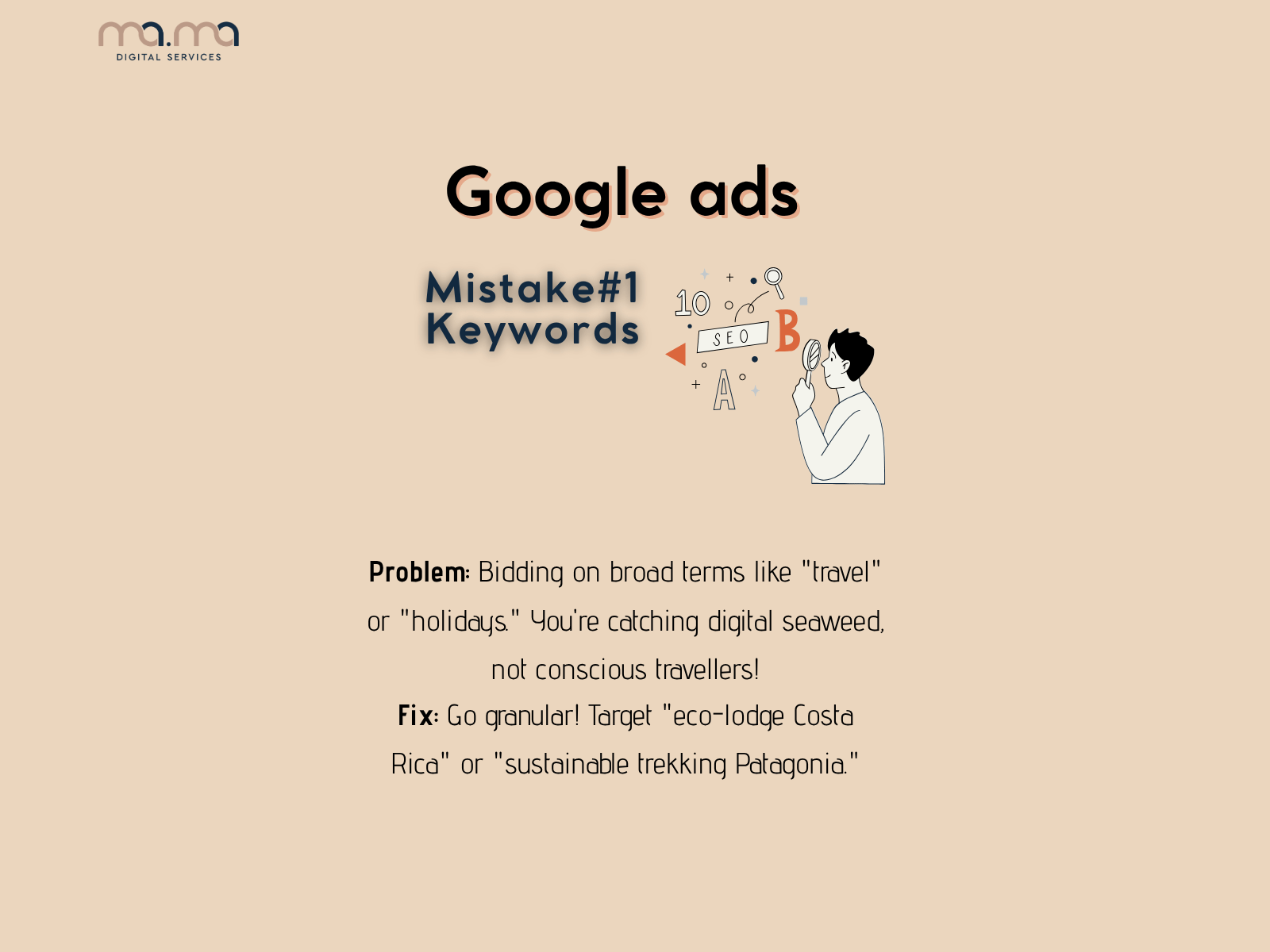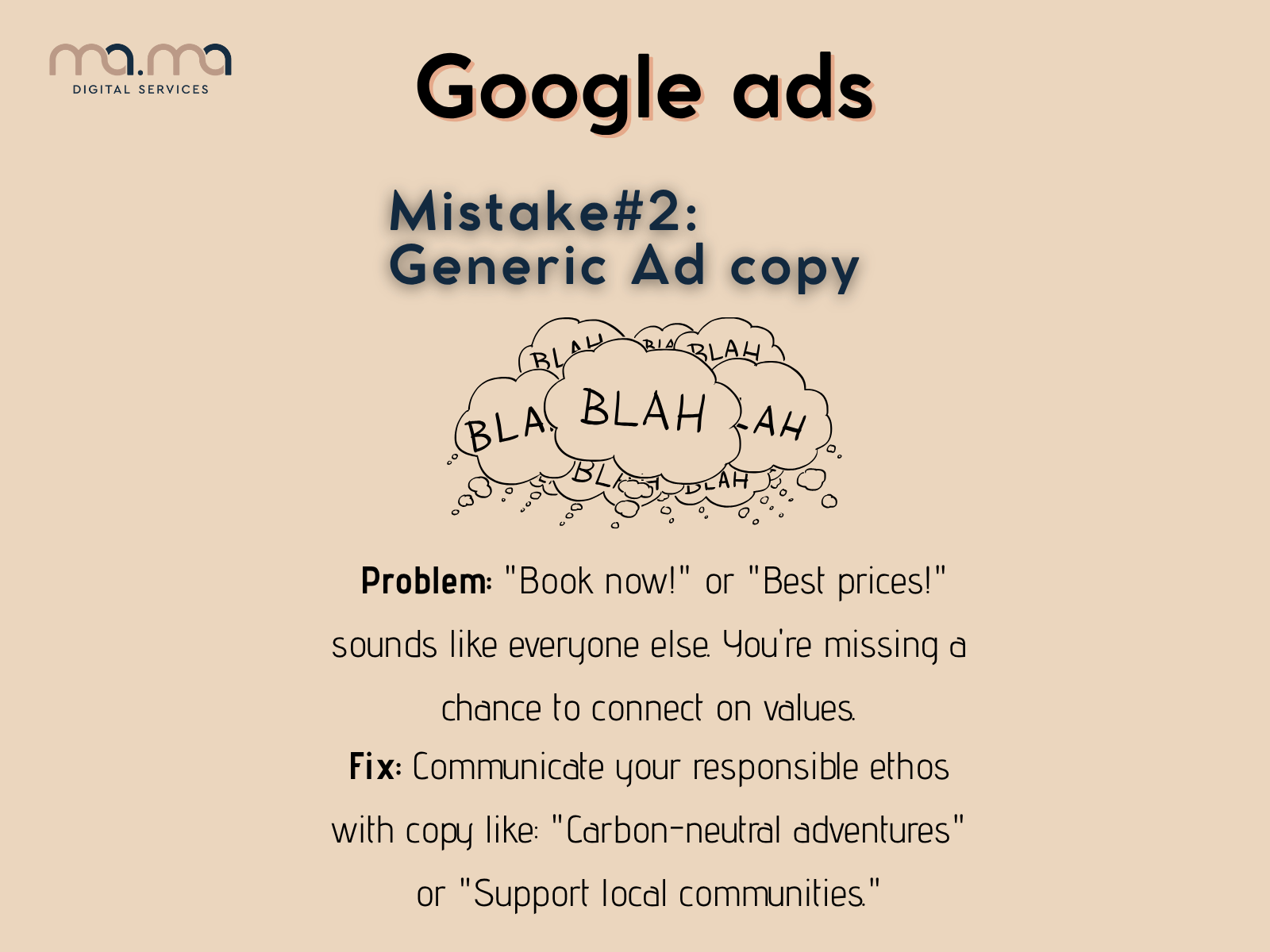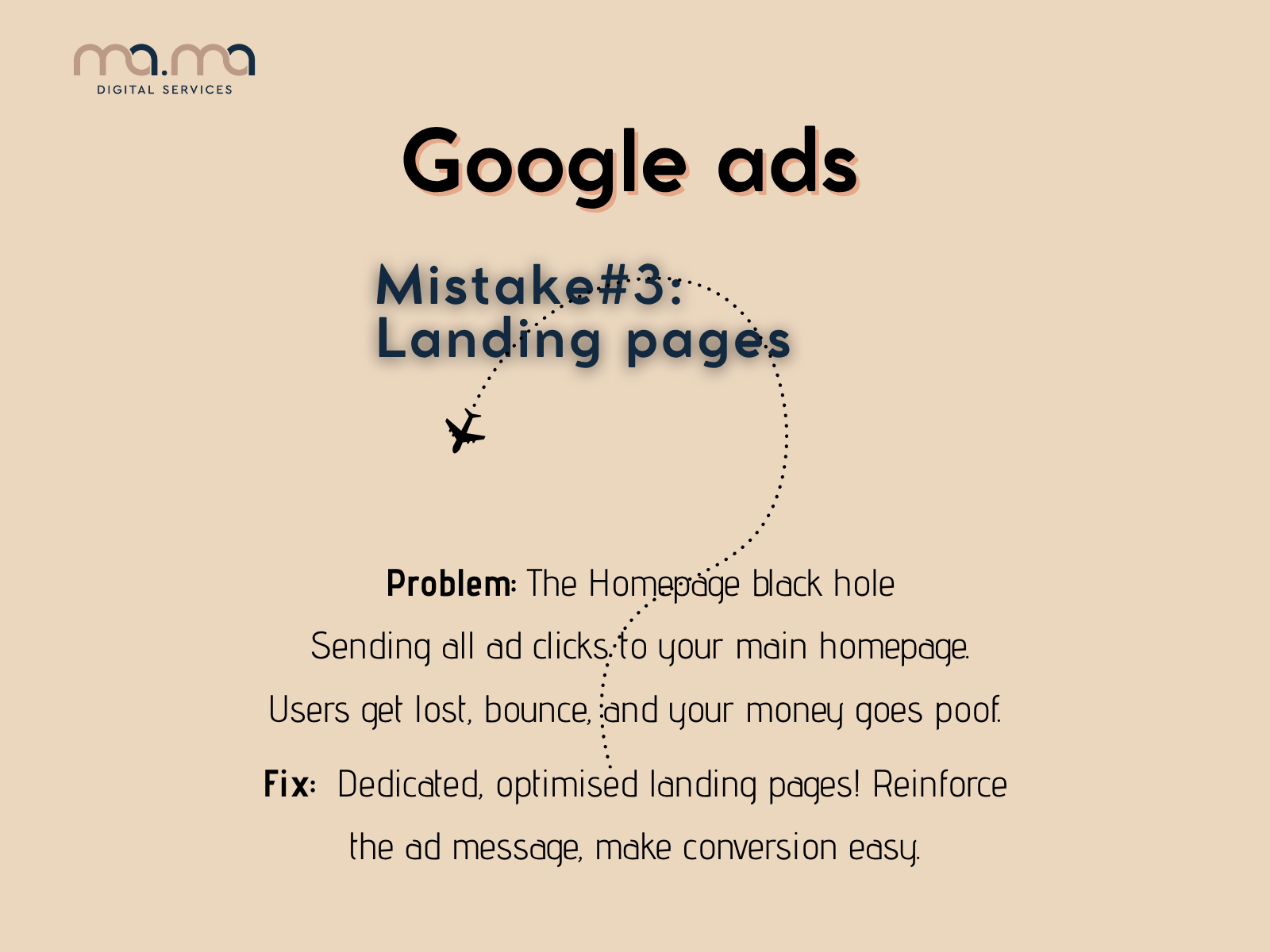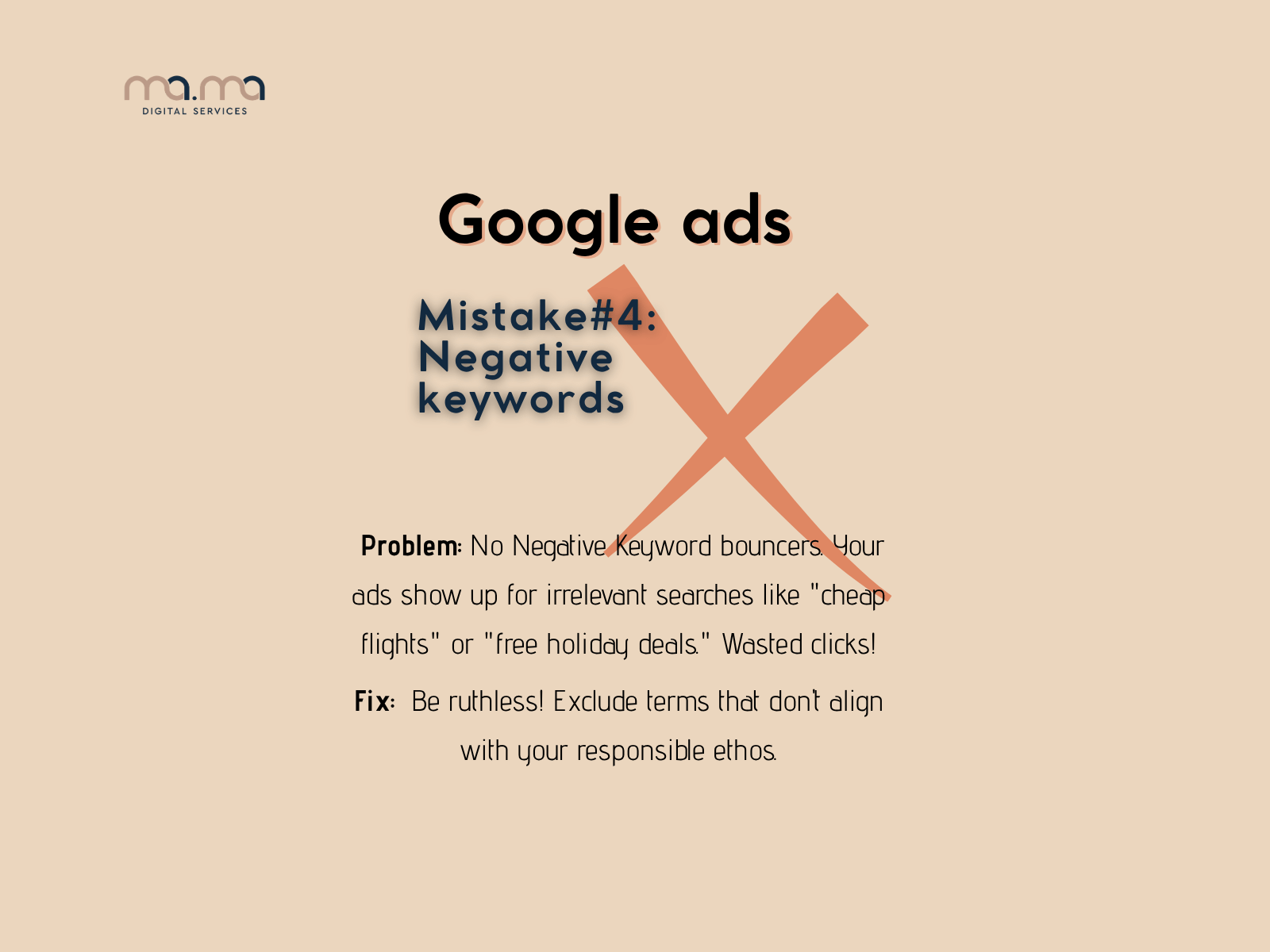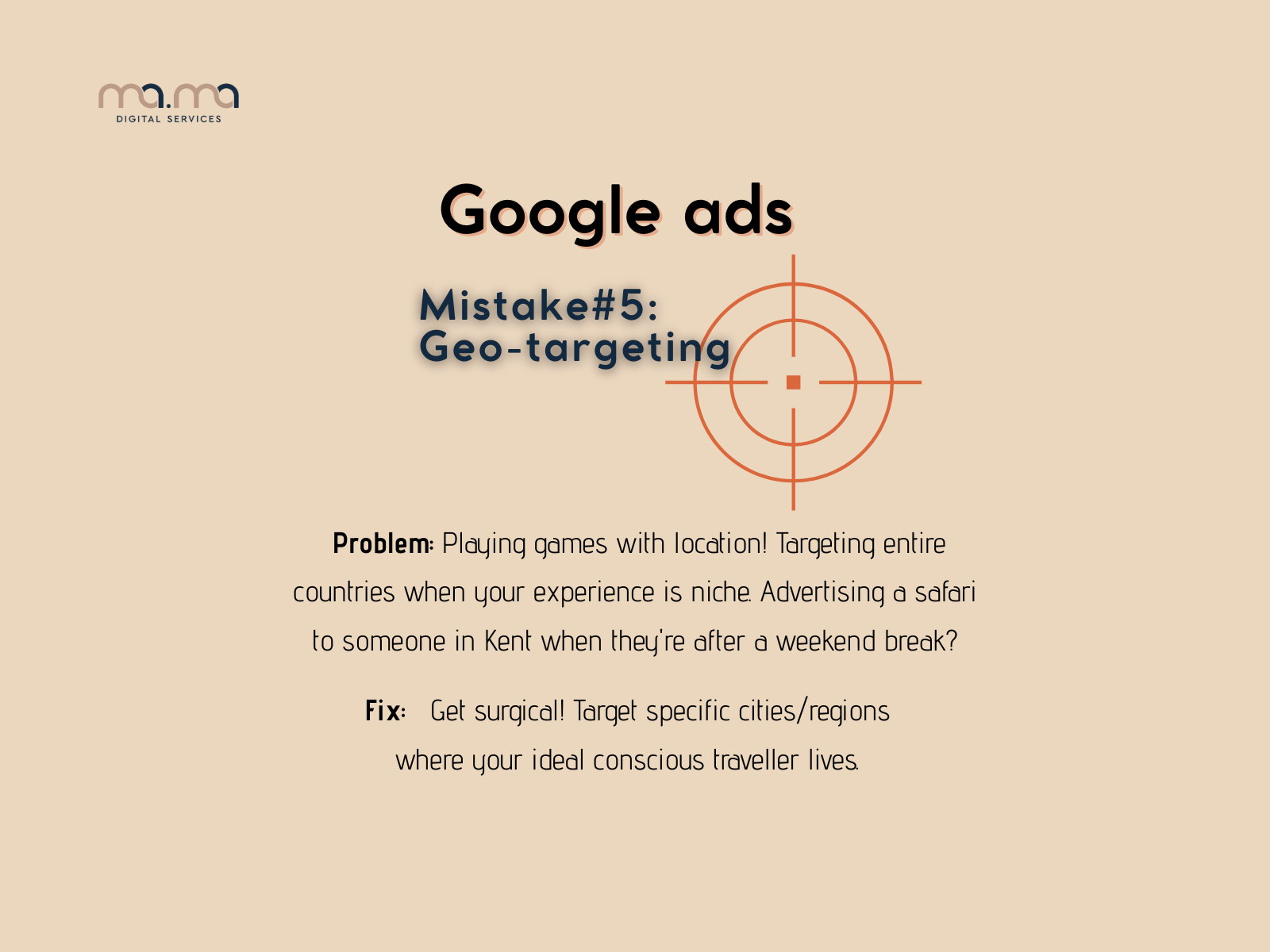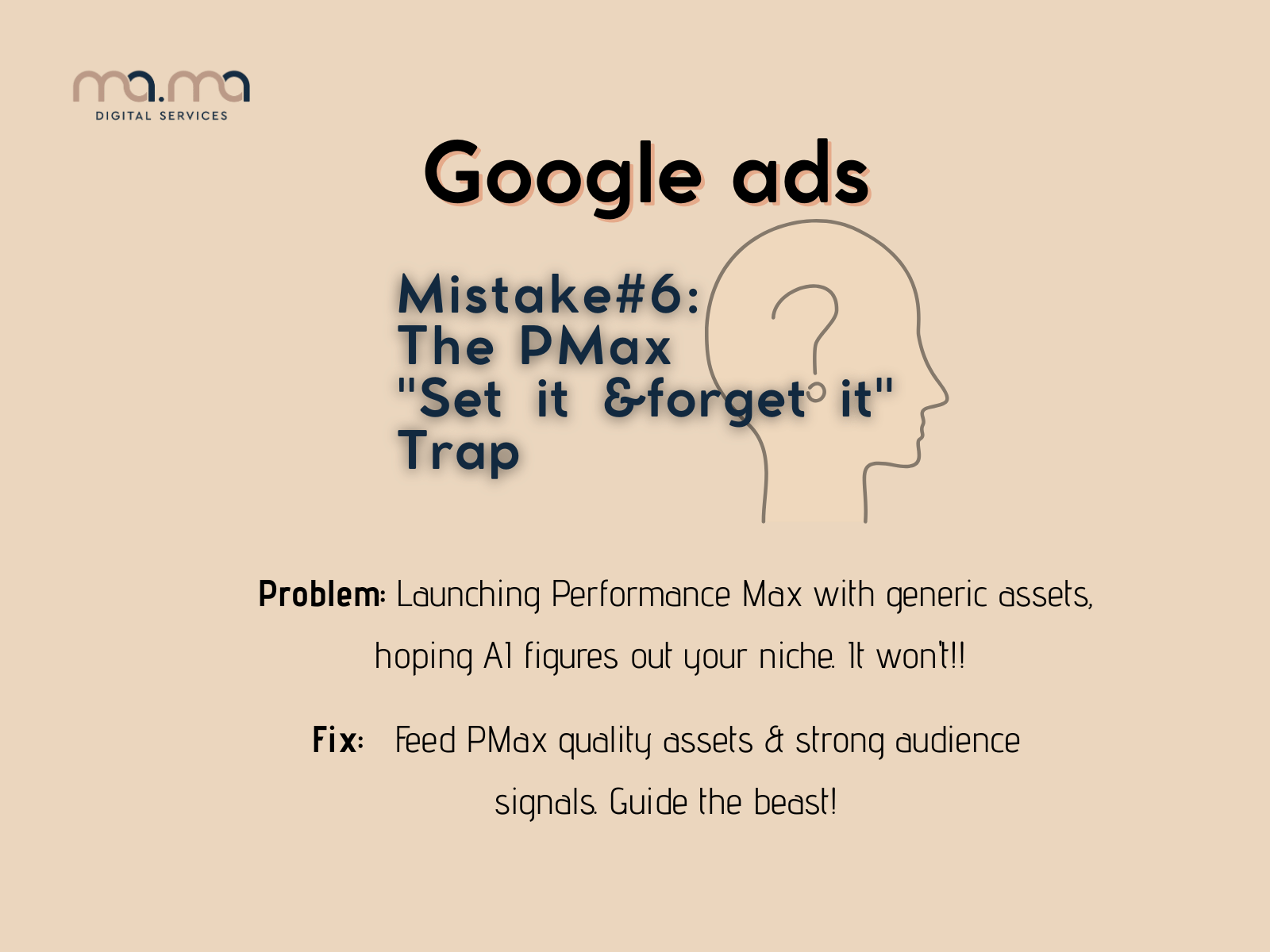Stop wasting money on Google Ads: 6 common mistakes made by Responsible travel businesses, and how to fix them!
Hey there, fellow travel lovers and business innovators!
You love Responsible travel, building something meaningful and making a positive impact on the world. That's great! You've put all your effort into creating experiences that really matter.
But getting the word out there? That's where things can get a bit tricky. This is especially true when it comes to Google Search Ads, and its newer, more mysterious cousin, Performance Max (PMax). It's easy to spend money on Google, cross your fingers, and hope for the best. But often, you're just wasting money on advertising, and you're not getting the results you want.
Don't worry, you're not alone. I see these mistakes all the time. But there is some good news. They can be fixed! Let's talk about some common mistakes with Google Ads that are costing you money, and how to turn that ad spending into bookings from the right kind of traveller.
Mistake 1: The "catch-all" keyword problem
STOP DOING THIS: bidding on super broad, generic terms like "travel," "hotel," or "tours."
Why it's a mistake: you're basically trying to catch a specific, rare fish with a net designed for whales. You'll compete with massive OTAs and global chains, pay a fortune per click, and attract anyone and everyone – mostly the wrong ones who are just looking for the cheapest deal, not your unique, responsible experience. You'll end up with a lot of digital seaweed and a hefty bill.
INSTEAD DO THIS: go granular! Think long-tail, specific, and responsible keywords.
The Smart fix: your ideal client isn't searching for "travel." They're searching for "eco-lodge Costa Rica," "sustainable trekking Patagonia," "ethical wildlife tours Kenya," or "volunteer travel marine conservation." These folks know what they want, they're further down the booking funnel, and they're actively looking for businesses like yours. They're ready to book, not just browse.
Read also: How to identify your niche as a travel business (a comprehensive guide for 2025 and beyond)
Mistake 2: Your Ad copy is a generic snooze-fest
STOP DOING THIS: using bland, "book now!" or "best prices!" ad copy that sounds like every other mass-market operator.
Why it's a mistake: if your Responsible travel business has a unique heart and soul, a powerful mission, and a story to tell, why are your ads sounding like a broken record? You're missing a massive opportunity to connect with your audience's values right from the first glance.
INSTEAD DO THIS: let your responsible flag fly high! Weave your ethos directly into your headlines and descriptions.
The Smart Fix: Your ad copy is like a secret handshake – if it doesn't say 'Responsible traveller,' they might just walk past. Highlight what makes you unique: "Support local communities," "Carbon-neutral adventures," "Authentic cultural immersion," "Ethical wildlife encounters." Speak directly to the values of your ideal client. Make them feel like they've found their tribe before they even click.
Mistake 3: The homepage black hole (aka no dedicated Landing pages)
STOP DOING THIS: Sending every single ad click to your main homepage.
Why it's a mistake: imagine clicking an ad for "sustainable family eco-tours in Costa Rica" and landing on your company's entire history page, or a general "about us." That's like ordering a vegan burger and getting the whole restaurant menu handed to you. Users get frustrated, bounce fast, and your ad spend goes poof.
INSTEAD DO THIS: create dedicated, optimised landing pages for each ad group (and PMax assets!).
The Smart fix: if your ad is for "sustainable family eco-tours in Costa Rica," the landing page should be all about that. It needs to reinforce the ad message, highlight the responsible aspects of that specific product, have clear calls to action (like "Book Your Eco-Adventure Now!"), and make it super easy for them to convert. No detours, no distractions. This is doubly important for PMax, which will use your landing page content to inform its targeting and messaging.
Read also: The 5 biggest myths about Responsible tourism
Mistake 4: Forgetting your negative keyword bouncers
STOP DOING THIS: letting your ads show up for irrelevant searches.
Why it's a mistake: you're paying for clicks from people who will never convert. Think "cheap flights," "free travel deals," "luxury resorts" (if that's not your vibe), or even competitor names if you're not strategically trying to poach. It's like inviting everyone to your exclusive Responsible travel event, including the guy who just wants free snacks.
INSTEAD DO THIS: be ruthless with your negative keyword list.
The Smart fix: negative keywords are your ad budget's bouncers. They keep the riff-raff out so your VIPs (Very Interested Purchasers) can get in. Actively build and refine a list of terms that don't align with Responsible travel or your specific offerings. Exclude "free," "cheap," "luxury" (if not applicable), and any specific competitor names you don't want to target. Save those precious clicks for people who actually care about what you offer.
Read also: From dream to digital destination: your ma.ma guide to launching a Slow & Experiential travel agency
Mistake 5: Playing hide-and-seek with location targeting
STOP DOING THIS: broadly targeting entire countries or continents when your responsible experience is niche or location-specific.
Why it's a mistake: are you advertising your sustainable safari in Kenya to someone looking for a weekend getaway in Kansas? Probably not the best use of funds. You're casting too wide a net, attracting people who are geographically irrelevant, and wasting clicks.
INSTEAD DO THIS: get surgical with your geo-targeting.
The Smart fix: target specific cities, regions, or even zip codes where your ideal responsible traveller lives or is actively planning to visit. Use Google's "people in or interested in" option for broader reach to planning travellers, but consider "people in" for highly localised offerings. If your eco-tours are in Peru, target people in major cities known for outbound travel to South America, not just "the world."
Read also: Serving up authenticity: digital ads that attract conscious travellers
Mistake 6: The PMax "set it and forget it" trap
STOP DOING THIS: launching a Performance Max campaign with minimal, generic assets and hoping Google's AI will magically figure out your Responsible travel niche.
Why it's a mistake: PMax is a powerful beast, but it's only as smart as the information you feed it. If you give it bland images, generic headlines, and no specific audience signals, it will default to mass-market messaging across all Google channels (Search, Display, YouTube, Gmail, Discover). This means your unique, values-driven brand could end up looking like any other travel provider, attracting the wrong kind of traveller, and diluting your message. It's like giving a super-robot a vague instruction and expecting it to bake your grandma's secret recipe.
INSTEAD DO THIS: treat PMax as a powerful engine that needs premium, highly-targeted fuel.
The Smart fix: PMax thrives on quality assets and strong audience signals.
Assets: provide a wealth of diverse, high-quality images and videos that explicitly showcase your Responsible travel ethos (local communities, sustainable practices, natural beauty). Craft headlines and descriptions that scream your values and unique selling points.
Audience signals: use your existing customer lists, website visitor data, and custom segments (e.g., people interested in "eco-tourism," "sustainable travel," "volunteer vacations") to guide PMax towards your ideal conscious traveller.
Landing pages: ensure the landing pages PMax sends traffic to are perfectly aligned with your responsible message and optimised for conversion (see mistake 3!). Don't let the AI wander off to irrelevant corners of your site. Guide it, feed it, and watch it perform!
Ready to stop burning cash and start attracting the right travellers?
Running Google Search Ads (and PMax!) for Responsible travel isn't about spending the most; it's about spending the smartest. These mistakes are incredibly common, but thankfully, they're easily fixable with a bit of strategy and know-how.
If you're feeling overwhelmed, or just want an expert eye on your campaigns to ensure you're attracting conscious travellers without setting your ad budget on fire, that's exactly what I'm here for.
Let's chat about getting your Responsible travel business noticed by the right people, in the right way.


